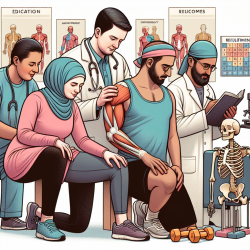In the realm of educational and therapeutic interventions, understanding the genetic underpinnings of growth can provide valuable insights for practitioners. Recent research has uncovered a novel common variant in the DCST2 gene that is associated with length in early life and height in adulthood. This discovery opens new avenues for practitioners to consider genetic factors when assessing and planning interventions for children’s growth and development.
The Role of DCST2 in Growth
The study identified a specific single nucleotide polymorphism (SNP), rs905938, within the DCST2 gene that significantly influences birth length, infant length, and adult height. The DCST2 gene is part of the DC-STAMP-like protein family, known to play a role in osteoclast cell-fusion regulation, which is crucial for bone development and homeostasis.
Key Findings
- The rs905938 SNP was associated with a 0.046 standard deviation increase in birth length.
- This variant also showed associations with infant length at one year and adult height, although the effect size decreased with age.
- The study highlights that while there is some overlap between genetic factors affecting birth length and adult height, distinct variants primarily influence early growth stages.
Implications for Practitioners
For practitioners working with children, these findings emphasize the importance of considering genetic factors as part of a comprehensive assessment. Here are some ways practitioners can integrate these insights into their practice:
- Holistic Assessment: Incorporate genetic information into assessments to better understand individual growth patterns.
- Personalized Interventions: Tailor interventions based on a child’s unique genetic profile to optimize outcomes.
- Collaboration with Geneticists: Work closely with genetic experts to interpret genetic data and apply it effectively in educational settings.
- Encourage Further Research: Stay informed about ongoing research in genetics to continually refine intervention strategies.
Encouraging Further Exploration
This research underscores the complexity of growth-related genetics and encourages further exploration into how these findings can be applied in practice. Practitioners are encouraged to stay updated through professional development opportunities such as conferences and webinars that focus on genetics and child development.
A novel common variant in DCST2 is associated with length in early life and height in adulthood
By integrating genetic insights into practice, educators and therapists can enhance their ability to support children's growth and development effectively. This approach not only benefits individual children but also contributes to the broader understanding of how genetic factors influence human development across the lifespan.










